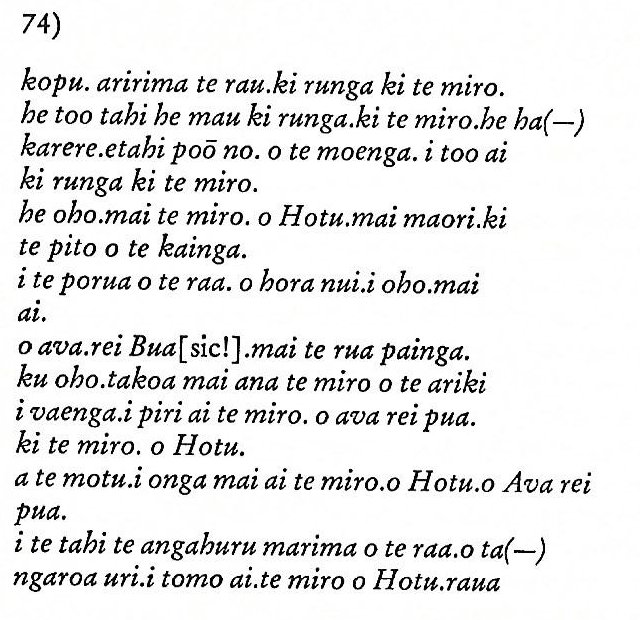
| he ki a Teke.kia
Oti.ka mau tahi te kaha
manu |
Teke said
to Oti, 'Take [ka mau] all the big calabashes
with the birds [te kahu manu] on board
the canoe!' |
| ena ki runga ki te
miro.he mau tahi e Oti. |
| Tahi.
Other; te tahi tagata someone else; te
tahi hoki... and others again...; te tahi...
te tahi..., some... others; te tahi atu,
the rest of them. Tahitahi, to scrape with a
sharpened stone. Vanaga. One, only, simple; te
tahi, next; e tahi, anyone; e tahi no,
unique, unity; e tahi e tahi, simultaneous. P
Mgv.: Mq., Ta.: tahi, one. Churchill.
... Several of the early missionaries comment
with a fine sense of humor upon the mistake the
islanders made in calling the cow when first seen a
bird. This is the word which led the good
missionaries into the error of their own ignorance.
Manu is as wholesale in its signification as
our word animal, it is generic. In the paucity of
brute mammalia the first missionaries found this
general term most frequently used of birds, and it
was their and not a Polynesian mistake to translate
manu into bird. In the material here
collected it will be seen that the significations
animal and bird are widely extended. In the
Paumotu insects are included; the same is true
of Mota, where manu signifies beetle
as well as bird. Nor is its applicability restricted
to earth and air; it reaches into the sea as well.
Samoa uses i'amanu (fish-animal) for the
whale ... (Churchill 2) |
|
E:73 → 584
/ 8 = 365 / 5
→ 40 (February 9) + 33 (→ Mira)
... On February 9 the Chorti
Ah K'in, 'diviners', begin the agricultural
year. Both the 260-day cycle and the solar year are
used in setting dates for religious and agricultural
ceremonies, especially when those rituals fall at
the same time in both calendars. The ceremony begins
when the diviners go to a sacred spring where they
choose five stones with the proper shape and color.
These stones will mark the five positions of the
sacred cosmogram created by the ritual. When the
stones are brought back to the ceremonial house, two
diviners start the ritual by placing the stones on a
table in a careful pattern that reproduces the
schematic of the universe. At the same time, helpers
under the table replace last year's diagram with the
new one. They believe that by placing the cosmic
diagram under the base of God at the center of the
world they demonstrate that God dominates the
universe. The priests place the stones in a very
particular order. First the stone that corresponds
to the sun in the eastern, sunrise position of
summer solstice is set down; then the stone
corresponding to the western, sunset position of the
same solstice. This is followed by stones
representing the western, sunset position of the
winter solstice, then its eastern, sunrise position.
Together these four stones form a square. They sit
at the four corners of the square just as we saw in
the Creation story from the Classic period and in
the Popol Vuh. Finally, the center stone is placed
to form the ancient five-point sign modern
researchers called the quincunx ... |
| ananake ko toona
titiro.ki runga ki te miro he ha(-) |
Oti and his
assistants took all of them on board the canoe and
left them there, the thirty-three [→ Mira] big
calabashes with the birds. |
| karere.atotoru
te kauatu.te kaha manu.he ho(-) |
|
...
Although an old constellation, Cetus is by no means
of special interest, except as possessing the south
pole of the Milky Way and the Wonderful Star, the
variable Mira; and from the fact that it is a
condensation point of nebulae directly across the
sphere from Virgo, also noted in this respect ...
...
Mira also known as Omicron
Ceti (ο
Ceti, ο
Cet), is a red giant star estimated 200-400 light
years away in the constellation Cetus. Mira is a
binary star, consisting of the red giant Mira A
along with Mira B. Mira A is also an oscillating
variable star and was the first non-supernova
variable star discovered, with the possible
exception of Algol. Apart from the unusual Eta
Carinae, Mira is the brightest periodic variable in
the sky that is not visible to the naked eye for
part of its cycle ...
... In 1638 Johannes Holwarda determined a period of
the star's reappearances, eleven months; he is often
credited with the discovery of Mira's variability.
Johannes Hevelius was observing it at the same time
and named it 'Mira' (meaning 'wonderful' or
'astonishing,' in Latin) in 1662's Historiola
Mirae Stellae, for it acted like no other known
star. Ismail Bouillaud then estimated its period at
333 days, less than one day off the modern value of
332 days, and perfectly forgivable, as Mira is known
to vary slightly in period, and may even be slowly
changing over time ...
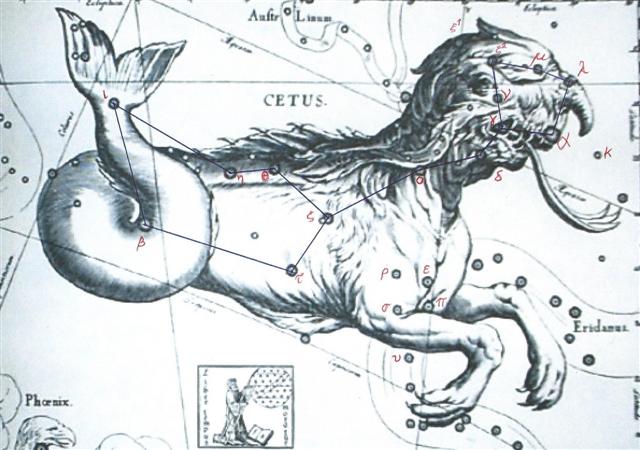 |
| ki mai te tangata.he
ki hokoou a Hotu.kia Teke. |
The men
returned [he hoki mai te tangata] and then
Hotu said to Teke, 'Take the people [ka too te
tangata] on board the canoe. Also remember the
stone figure and take it on board the canoe.' |
| ka too te tangata ki
runga ki te miro.e manau
tokoa koe |
| ki te moai ena e mau
ki runga ki te miro. |
|
Topa. 1. To
bend down, to drop to the ground; to fall on a
certain date. 2. To stop doing something, to drop;
ina ekó topa taau aga, do not stop, keep
doing your work. 3. To remain, to be left over, to
be unfinished; he topa te kai, the food is
not finished, there is some left. 4. To come to
one's memory; i te aamu he topa te vânaga tûai,
in the legends old words come to memory. 5. To
remember, to reflect (with mana'u as
subject); e-topa rivariva tokorua mana'u ki te
me'e nei, let the two of you think carefully
about this thing. Vanaga. 1. Wine; topa tahaga,
id. 2. To fall in drops, to descend, to go down, to
abdicate; topa iho, to fall; hakatopa,
to knock down, to cause to fall; hakatopa ki raro,
to knock down, to subjugate. 3. Childbirth,
abortion; topa te poki, to lie in. 4. A
feast, to feast. 5. To arrive, to result; topa
rae, newcome; topa iho, to come
unexpectedly; topa ke, to deviate; topa no
mai, topa hakanaa, topa tahaga,
mau topa pu, unexpected; topa okotahi,
solitary; hakatotopa, to excite, to foment.
6. Bad, low, cheap, failure; igoa topa,
nickname; ariga topa, sinister, sly,
ill-tempered, to hang the head; hakatopa, to
disparage; hakatotopa, irresolute. 7. (Of
upward movement) topa ki raro, to scale, to
surpass; hakatopa ki te ao, to confer a
dignity; hakatopa ki te kahu, to spread a
sail; hakatotopa, to make a genealogy.
Churchill. |
| he oko[oho?].a
Teke.he too mai i te tangata.he
tataku i te |
Teke went,
brought the people, counted the men and also the
women and the children.
Two thousand (erua piere) men, women, and
children made up the people (aniva) of Hotu. |
|
tangata.i te vie tokoa.i te poki tokoa.erua |
|
te piere.te aniva.o
Hotu.he too taa tangata. |
|
Tapa. 1.
Side, corner, edge; he-hakarere a te tapa, to
leave aside, to abandon; a te tapa mata'u o te
haga, on the right-hand side of the bay. 2.
Tapa mahute, piece of mahute material;
this term is very common nowadays, but it seems
probable that it was borrowed from the Tahitian in
replacement of parehe mahute. 3. To
recount the years, the months; to recount happenings
of many years ago, in verses called manu, in
which a murderer confided his crime to his victim's
relatives; the murderer himself asked a brother or a
friend to compose those verses: e tapa koe itooku
manu, compose my manu. The expression
tapa ite manu was also used of a group of people
expressing the desire to kill someone. 4. Tagata
tapa ta'u, according to traditions, this term
referred to the scribes who recorded births on the
tablets. Vanaga. 1. Border, fringe, edge, groin,
cloth, clothing, dress, garment. Tatapa,
lateral, bank. Tapatapa, edge. P Mgv.:
tapa, the edge of the bast cloth, bast cloth in
general. Mq.: tapa, fringe, cloth. 2. To
name, to mention, to count, to calculate, to reckon,
to number, to figure up, to recapitulate; tapa ki
te igoa, to take a census; tapa igoa,
list. Tatapa, to count, to number, to reckon.
Tapatapa, to mention. P Mgv.: tapa, to
give a pet name. Mq.: tapatapa, to recite, to
invoke; tatapa, to take the name of some one,
to announce by name. Ta.: tapa, to call by
name. Churchill. Mq.: Tapaau, coconut leaf
plaited to serve as a mat. Sa: tapa'au, a
coarse coconut leaf mat. Tapatai, a dweller
on the strand. Ma.: tapatai, beach.
Churchill.
Tata.
1. To wash something. 2. To go; he-tata-mai,
to come, to appear, to show up. Vanaga.
Tátá - see
tá.
Vanaga. 1. Agony, severe pain, apparent death. 2.
Next, proximity;
hakatata, to bring close together. 3. To
strike; tata ei
taura, to flog, to lash. 4. To wash, to
clean, to soap, to rinse. 5. To appear, to approach,
to advance, to present;
hakatata, to advance, to propose, to
accost. Churchill.
Taku.
Prediction, prophecy, prognostic, to predict;
tagata taku,
wizard. P Ta.: tau,
to invoke, to pray.
Takurua, full of stones, pebbly, stony, a
path among the rocks. Churchill. Samoa:
ta'u, to
tell, to mention, to announce, to certify, to
acknowledge. Tonga:
taku, to call by, to designate;
takua, to
mention, to call by name.
Rapanui;
taku, to
predict. Maori:
takutaku, to threaten, to recite
imprecations. Fotuna:
no-tukua, to confess. Viti:
tukuna,
to report, to tell. Churchill 2.
At the risk of invoking the criticism, 'Astronomers
rush in where philologists fear to tread', I should
like to suggest that Taku-rua corresponds
with the two-headed Roman god Janus who, on the
first of January, looks back upon the old year with
one head and forward to the new year with the other,
and who is god of the threshold of the home as well
as of the year... There is probably a play on words
in takurua - it has been said that Polynesian
phrases usually invoke a double meaning, a common
and an esoteric one. Taku means 'slow', the
'back' of anything, 'rim' and 'command'. Rua
is a 'pit', 'two' or 'double'. Hence takurua
has been translated 'double command', 'double rim',
and 'rim of the pit', by different authorities.
Taku-pae is the Maori word for 'threshold'...
Several Tuamotuan and Society Islands planet names
begin with the word Takurua or Ta'urua
which Henry translated Great Festivity and which is
the name for the bright star Sirius in both New
Zealand and Hawaii. The planet names, therefore,
represent the final stage in the evolution of
takurua which was probably first applied to the
winter solstice, then to Sirius which is the most
conspicious object in the evening sky of December
and January, and was then finally employed for the
brilliant and conspicious planets which outshone
even the brightest star Sirius. From its association
with the ceremonies of the new year and the winter
solstice, takurua also aquired the meaning
'holiday' or 'festivity'. Makemson. |
| ki runga ki te
miro.i te moai tokoa. (Insertion: te ingoa o
te |
The men
also (wanted to) take the figure on board the canoe
(addition in parenthesis: the name of the figure was
Oto Uta), but they left the figure out in the bay [i
mua ana i te hanga i rehu ro ai.te moai]. |
| moai.ko oto uta).
i mua ana i te hanga i rehu ro ai. |
|
ko oto uta |
ariki motongi |
1 |
Hamal (*30)
|
|
ko tangaroa.a oto uta |
ariki motongi |
2 |
(*57) |
|
ko tiki hati.a tangaroa |
ariki motongi |
3 |
(*84) |
|
ko roroi.a tiki hati |
ariki motongi |
4 |
(*111) |
|
ko tuu kumā.a roroi |
ariki motongi |
5 |
(*138) |
|
ko ataranga.a tuu kumā |
ariki motongi |
6 |
Alkes (*165 = 348 - 183) |
|
ko harai.a ataranga |
ariki motongi |
7 |
Bharani (*41) |
|
ko taana.a harai |
ariki motongi |
8 |
Aldebaran (*68) |
|
ko matua.a taana |
ariki motongi |
9 |
Canopus (*95) |
|
ko hotu.a matua |
ariki motongi |
10 |
Antares (*249) |
Uta.
Higher up (from the coast, or from another place);
i uta era, further up, up there; ki î te
îka i uta, as there are lots of fish on the
beach. Vanaga. 1. Inland, landward; paepae ki uta,
to strand, to run aground; mouku uta,
herbage. 2. To carry; uta mai, to import;
hakauta, to give passage. Campbell.
 |
| te moai.e
iri era te tangata ki
runga ki te |
The people
went on board the canoe, and bananas, yams, taro,
sweet potatoes, chicken, and also [tokoa]
pigs (?) and all kinds of [anakeanake] shoots
(huri) were added. |
| miro.ko te maika. ko
te uhi.ko te taro.ko te kumara. |
| ko te moa.ko te
kekepu. tokoa.ko te huri tokoa. |
| anakeanake te huri. |
| Iri,
1. To go up; to go in a boat on the sea (the
surface of which gives the impression of going up
from the coast): he-eke te tagata ki ruga ki te
vaka, he-iri ki te Hakakaiga, the men boarded
the boat and went up to Hakakainga. 2.
Ka-iri ki puku toiri ka toiri. Obscure
expression of an ancient curse. Vanaga. Iri-are,
a seaweed. Vanaga. |
| he ki a Matua.kia
Hotu. ka too (Crossed out: toa te hanau eepe) |
Matua said
to Hotu, 'Take along [ka too toa te hanau
eepe] [also, tokoa] the Hanau
Eepe and let them work [mo keukeu] the
land!' |
| tokoa te hanau
eepe.mo keukeu o tou kainga.he ra(-) |
| ngi.a Hotu kia
Teke.ka oho.ka too te tangata. |
Hotu called out [he
rangi] to Teke: 'Go along and bring |
|
E:74 → (392 +
348) / 10 → 80 - 6 (ono) |
|
kopu.
aririma te rau.ki runga
ki te maro. |
the 500
prisoners on board the canoe!' He took all of them
[tahi he mau] along, led them on board the
canoe, and left them there [he hakarere].
For six days (po ono), mats (moenga) were taken
on board the canoe (i.e., the loading of the canoe
took six days). |
| he too tahi he mau
ki runga.ki te maro.he ha(-) |
|
karere.etahi poō no. o
te moenga. i too ai |
|
ki runga ki te miro. |
| Kopu.
Heart, breast, paunch, belly, entrails; kopu
mau, stomach; kopu takapau nui, big
belly; mamae kopu, bellyache. T Pau., Mgv.:
kopu, belly, paunch. Mq.: kopu, opu,
belly, stomach, breast. Ta.: opu, belly,
intestines, spirit, intelligence. Churchill. Ta.:
opu, to rise, of the sun. Ma.: kopu, the
morning star. Churchill. Turirima, elbow.
... Fakataka
swims and swims, reaching another land. She goes
there and stays on the upraised reef in the
freshwater pools on the reef, and there delivers her
child, a boy child. She gives him the name
Taetagaloa. When the baby is born a golden
plover flies over and alights upon the reef.
(Kua fanau lā te pepe kae lele mai te tuli oi tū
mai i te papa). And so the
woman thus names various parts of the child
beginning with the name 'the plover' (tuli):
neck (tuliulu), elbow (tulilima), knee
(tulivae) ...
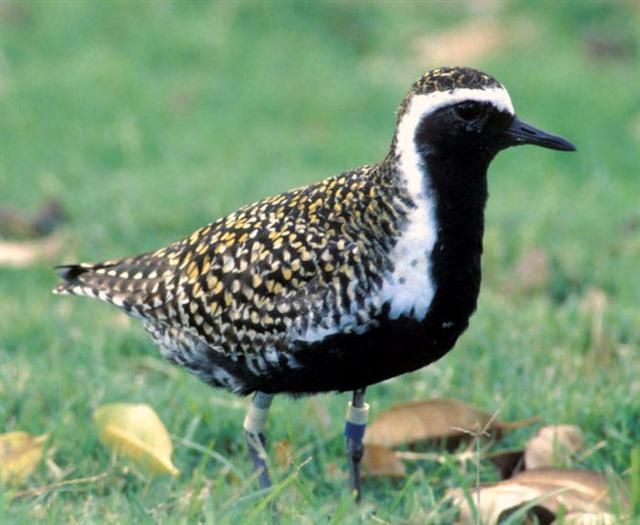
Ai. Aai 1. Who: interrogative pronoun used
in place of koai te mee...: Aai i-tu'u-mai-nei,
e-haúru-ró-ana au? = Koai te mee i-tu'u-mai-nei,
e-haúru-ró-ana au? Who is it who came here when
I was sleeping? 2. Whose: genitive pronoun. Vanaga.
1. (Ko ai) Who, which. 2. Then. 3.
Consequence. 4. (Hai). Churchill. |
|
he oho.mai te miro. o
Hotu.mai maori.ki |
Hotu's
canoe [te miro. o Hotu] sailed [he oho]
from Maori to Te Pito O Te Kainga. |
|
te pito o te kainga. |
|
i
te porua o te raa. o hora nui.i oho mai. |
It sailed
on the second day of September (hora nui). |
|
ai. |
|
o ava.rei Bua
(sic!).mai te rua painga. |
The canoe of the king (ariki
is used here incorrectly for tapairu
'queen'), of Ava Rei Pua, |
| Although
the Easter Islanders still cautiously kept all their
small stone and wood carvings in hiding, they did
reveal their own artistic talent and activity by
carrying forth colossal paina figures in the
presence of the Spaniards [1770]. These were
skilfully made light-weight dolls of superhuman
size, fashioned from painted bark-cloth stuffed with
branches, grass, and reeds. They were carried in
processions and erected at the side of old image
platforms, as if they represented some substitute
for the giant stone men of the Middle Period that
this historic or Late Period population was unable
to carve or erect. Agüera (Ibid., p. 95)
gave the following account of the paina
figures, after a description of the ancient stone
statues of which an unspecified number were still
standing on ahu: 'They have another effigy or
idol clothed and portable which is about four yards
in length: it is properly speaking the figure of a
Judas, stuffed with straw or dried grass. It has
arms and legs, and the head has coarsely figured
eyes, nostrils, and mouth: it is adorned with a
black fringe of hair made of rushes, which hangs
half-way down the back. On certain days they carry
this idol to the place where they gather together,
and judging by the demonstrations some of them made,
we understood it to be the one dedicated to
enjoyment ...(Heyerdahl 3) Der Cultus bestand in Anrufung der Götter, deren
Willen der Priester erklärte, in Opfern an
Lebensmitteln, auch an Menschen, und in der Feier
gewisser, zu bestimmten Zeiten wiederkehrender Feste
(rakauti), von denen das erste im Früjahr 2
Monate dauerte, das zweite im Sommer mit der
Errichtung einer Pyramide aus Zweigen (paina)
endete, das dritte in den Winter fiel; bei allen
fanden Tänze, Gesänge, Spiele aller Art statt.
(Churchill: From 'Die Inseln des stillen Oceans' by
Carl E. Meinicke; zweiter Theil, 1876, p. 228.) Paina.
Human likeness, large doll (made in ancient times).
Vanaga. T. To make a noise. H. To sound, as in
breaking or tearing anything. Churchill.
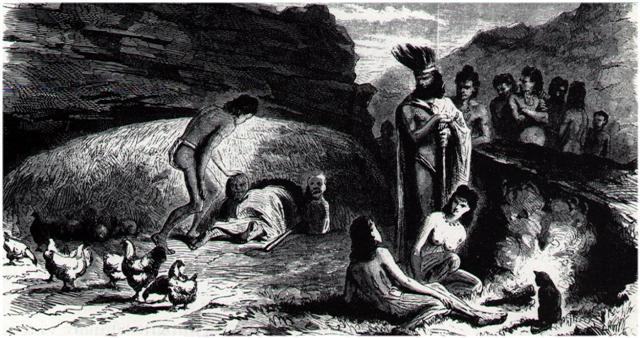 |
|
ku oho.takoa mai ana te
miro o te ariki |
also sailed on the
other side [ku oho tako'a]. |
|
i vaenga.i piri ai te
miro. o ava rei pua. |
They had
attached [i piri ai] the canoe of Ava Rei Pua
to the middle [i vaenga] of the canoe of Hotu
(i.e., a double canoe had been built for the long
voyage across the sea.) The canoe of Ava Rei Pua
and of Hotu were seen near the (offshore) islets. |
|
ki te miro. o Hotu. |
|
a te motu.i
onga mai ai te miro. o
Hotu.o Ava rei |
|
pua. |
| Aro.
Face, front, side (of a figure); ki te aro o
..., to the front of ... Vanaga. Presence, body,
frontispiece; ki te aro, face to face. P
Pau.: aroga, the visage; ki te aroga,
opposite. Mgv.: aro, presence, before; i
te aro, in the presence of. Mq.: aó,
face, in the presence of, before. Ta.: aro,
face, front, presence, view. It is probable that
more than one word is confounded in alo. The
significations which appear in Southeast Polynesia
are most likely derived from a Tongafiti alo
and do not appear in Nuclear Polynesia. The alo
belly and alo chief which do occur in Nuclear
Polynesia are also probably Tongafiti, for in Samoa
and Tonga they are honorific and applied only to
folk of rank, a good indication of borrowing by the
Proto-Samoans from Tongafiti masters. Churchill. In
the Hawaiian group, the western portion or side of
an island was called 'the front', ke alo, of
the land, and the eastern side was called 'the
back', ke kua. The reason of such
designations must be sought in the fact of the
arrival of the inhabitants from the west. Fornander. |
|
i te
tahi te angahuru marima o te raa.o ta(-) |
On the
fifteenth day of the month of October (tangaroa
uri) the canoe of Hotu and the canoe of Ava
Rei Pua landed. |
|
ngaroa uri i tomo ai.te miro o Hotu.raua |
From September 2 (day 245 in the Gregorian calendar) up to and including October 15 (288) there were 44 (= 288 - 244) days.
| January |
31 |
31 |
| February |
28 |
59 |
| March |
1 |
60 |
| 31 |
90 |
| April |
14 |
288 - 184 |
| 30 |
120 |
| May |
31 |
151 |
| June |
30 |
181 |
| July |
31 |
212 |
| August |
31 |
243 |
| September |
1 |
60 + 184 |
| 29 |
273 |
| October |
15 |
288 = 244 + 44 |
| 31 |
304 |
| November |
30 |
334 |
| December |
31 |
365 |
On the other side of the year - i te rua paiga - we can measure the corresponding distance from March 2 (61) up to and including April 14 (104).
... February 24 was 'the sixth day before the Kalends of March' using Roman inclusive counting (March 1 was the 'first day') ...
However, earlier the Explorers had sailed from their old homeland in Vaitu nui 25 and arrived in Te Maro 1 (152). 152 - 114 = 38.
... On the twenty-fifth day [raa] of the first month ('Vaitu Nui'), Ira and Makoi set sail. (i te rua te angahuru marima raa o te vaitu nui.i oho.mai ai a ira.ko Makoi), on the first day [te raa po rae] of the month of June ('Maro'), the bow [te ihu] of Ira's canoe touched land again. (E:17)
44 (288 - 244) = 38 (152 - 114) + 6 days. The loading of the double canoe of Hotu A Matua took 6 moega days.
Moe. To sleep, to lie at full length, to dream, to brood, to place, to cohabit; moe atu, to leave off, to desist; moe atu ra, to adjourn, to postpone; moe hakahepo, to talk in the deep; moe aherepo, somnambulist, sleepwalker; moe hakataha, to sleep on the side; moe no, to oversleep, concubinage; moe tahae, to be a light sleeper; moe tahaga, a sleeper; moe vaeahatu, moe hakaroa, to sleep sprawling; rava moe, to sleep sound; ariga moe ki raro, to lie flat on the ground; tae moe, bachelor; hakamoe, to brood, to fold the wings; to reserve, to lay up; to struggle. P Pau.: moe, sleep. Mgv.: moe, sleep, to lie down, coitus, to shut the eyes. Mq.: moe, to sleep, to lie down; haámoe, to set down on the ground. Ta.: moe, to sleep, to lie down. Moea raruga, lying flat. Moeaivi, thin. Mq.: ivi, haáivi, id. Ta.: ivi, id. Moega, mat. Pau.: moehega, bed. Mgv.: moega, a sleeping mat. Mq.: moena, moeka, mat, floor cloth, bed. Ta.: moea, bed. Moemata, to sleep with the eyes open; mea moemata, phantom. Moemoea, a dream, vision; tikeahaga moemoea, apparition by night. T Mgv., Mq., Ta.: moemoea, dream. Churchill. Mgv. Moemoe, to steal, to purloin at a food distribution. Mq.: moemoe, to seize, to grasp. Churchill. Ta.: 1. Moemoe, ambush. Ha.: moemoe, id. 2. Moemoe, Phyllanthus simplex. To.: mohemohe, a tree. Churchill. Mq.: Moehu, exiled, banished, prisoner of war. Ma.: morehu, a survivor. Churchill.
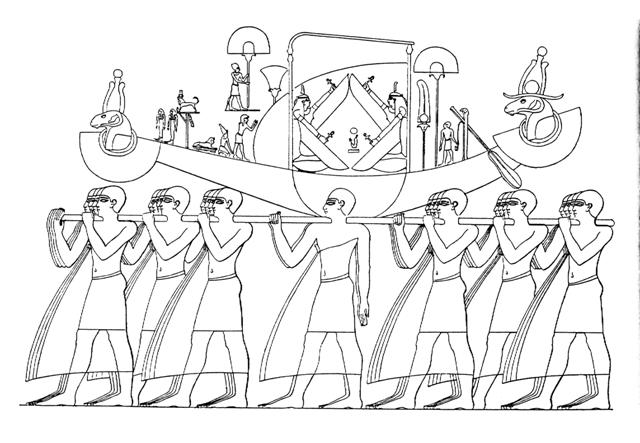
|





